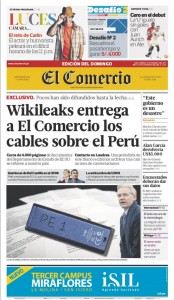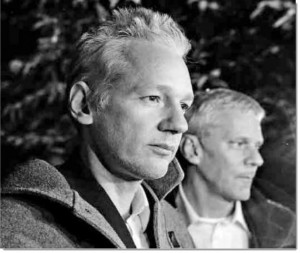 Peru’s leading daily newspaper, El Comercio, announced in its Sunday edition that it has received more than 4,000 U.S. State Department diplomatic cables from Wikileaks.
Peru’s leading daily newspaper, El Comercio, announced in its Sunday edition that it has received more than 4,000 U.S. State Department diplomatic cables from Wikileaks.
The newspaper revealed two of the cables on Sunday. The first covers a conversation in 2006 just after the presidential elections, when APRA Congressman and co-secretary general Jorge del Castillo requested the help of the U.S. Embassy to convince PPC candidate Lourdes Flores to accept her defeat against Alan Garcia (a difference of a little under 70,000 votes) and join forces with APRA to defeat the nationalist candidate, Ollanta Humala, in the second election round, in exchange for a working relationship or co-participation in the Garcia administration.
The second cable, dated March 2008, reports on the work by Hugo Chavez in Venezuela to help Ollanta Humala and other radical groups to organize an anti-summit in Lima for May that year, at the same time as the Latin America Caribbean and European Union Summit, EU-LAC, to which 60 heads of State and Government arrived. Thousands gathered for the anti-summit but in the end the only head of state present was Evo Morales of Bolivia. President Chavez was in Lima for the EU-LAC summit but did not attend the anti-summit.
In a full-page article, El Comercio Editor Rossana Echeandía told the intriguing story of the initial phone call she received on Jan. 22 from an anonymous intermediary, asking if she would mind being contacted by a foreign journalist to discuss an important matter.
She replied that she would be happy to hear from the reporter, but she wrote that the significance of the phone call was not immediately apparent.
“I thought it had to do with some foreign journalists who were looking for information about Peru for an article they were working on,” Echeandía wrote.
Two days later, she received a phone call from London.
“”Hello,’ I was greeted in perfect Spanish. ”They gave me your phone number to contact El Comercio because I wanted to know if you would be interested in receiving very important information that would be coming from London.'”
Echeandía got the picture, and sat upright in her chair. “Are you XX?, I asked.”
The voice replied that it would be better not to mention any names over the phone.
“I was asked if I had been keeping up on news about the Wikileaks cables. Obviously, I said, I’m a journalist. And I was offered the material related to Peru.”

“So ignorant of how this thing would work, I proposed that all the information be passed to me via e-mail (now I suspect upon hearing that, there was a smile and a shake of the head at the other end of the line), but no, that was not possible; I also proposed that one of our correspondents in Europe could travel to London to pick up the cables, but that did not fly either. They wanted it to be me.”
Echeandía was given an email address and the phone conversation ended.
She wrote to the address and received an automatic reply from the Wikileaks server apologizing that the inbox was full. The next day, she got an e-mail from the source with a phone number for her to call. She tried several times to do so, but every time there was an answer at the other end, the line would be cut off. A series of ambiguous e-mails followed until February 4, when she got a firm request for a face-to-face meeting the following Wednesday in London.
When Echeandía arrived to the rendezvous point, she was picked up by a car and taken to another location. There, she finally met her contact, as well as Kristinn Hrafnasson, director of Sunshine Press Productions, an Iceland-based company set up by Wikileaks to help continue its world-wide whistleblower operation.
Echeandía and Hrafnasson signed a “memorandum of understanding” for the delivery of the 4,000-plus diplomatic cables from 2006-2010 pertaining primarily to Peru, as well as a few on Bolivia.
“That is what we were doing when, unexpectedly, the door opened and a tall thin man entered, his face unmistakable: Julian Assange,” Echeandía wrote.
“I did not expect to meet him. He did not accept my request for an interview nor to have his photo taken, but we were able to exchange a few words. He was interested in the case of the ‘Petroaudios’ in Peru, as well as Cusco, saying that he would like to visit although evidently, he lamented, for the time being that would not be possible.
Editorial from today’s Sunday El Comercio
Wikileaks: our duty to inform
As has happened with other large news outlets in the world, El Comercio has received the Wikileaks cables, classified documents from the Department of State of the United States of America. The delivery of more than 4000 pages about Peru explain in part the dynamic of national politics and international relations.
Since November 2010 Spain’s El Pais, America’s New York Times, Britain’s The Guardian, France’s Le Monde and Germany’s publication Der Spiegel, have published thousands of cables about events relevant to their nations and the world.
We cannot deny, however, that the lack of rigor in some cases generated a grand show and delivered a lot more noise than substance.
We are aware that the gradual release of these documents that we have been corroborating with all those involved — or at least attempting to do so, if not with the cooperation of all of them — will not be met with indifference by the readers of this journal.
El Comercio has made this decision serenely and thoughtfully, putting first the interests of the reader and the right to be properly informed about people who, for better or worse, can influence the destiny of our nation.
We have imposed a strict protocol to separate the wheat from the chaff, the relevant from the trivial and it is our commitment not to compromise the honor and integrity of people whose security could be threatened if their identity were revealed. Any issue that endangers the security of our country, our neighbors, the United States and the interests of peace, will not be published here.
As duly noted in this column, the facts have demonstrated that the massive filtration of such information has marked a “before” and “after” in the relations between nations and in communications. After the so-called ‘Cablegate’ the world is a different place.
For our Nobel Laureate, Mario Vargas Llosa, it seems that these publications defend us “against intrigues and maneuvers, which are always linked to political life and especially to power.” But he is concerned about the danger that “all forms of confidentiality” could disappear to the point that states cannot function, creating “a fragility of such that institutions, one after another, are discredited, as well as the essence of democracy.”
In the same vein, for the Italian semiotician Umberto Eco, the Wikileaks documents have a dual value. On the one hand, it is no more than a scandal, a scandal because of the revelation of hypocrisy that governs relations between states, citizens and the press. On the other hand, it forecasts major changes worldwide and “portends a future dominated by regression” [in other words, stepped-up efforts to protect secrets in the digital age].
The director of the Spanish newspaper “El País”, Javier Moreno, is convinced that the documents show that the “political class in advanced democracies have been deceiving their citizens.”
The readers of El Comercio may wonder why we have decided to publish these cables. The answer is that we consider it necessary, now more than ever, to put out this information that is absolutely in the public interest.
We do not know the criteria used to select the information that was received — which covers a period from 2006 to 2010 — so we are not able to say that these are all the documents produced during this period about Peru. In today’s newspaper, we cover two of the cables, and in the course of the week we will resume publication.
Independence has been the stated cornerstone of our newspaper since 1839, a key factor in achieving the accuracy and therefore credibility that has been our hallmark during almost 172 years. Confronted with the contents of the cables that we have in our hands, we decided to make them available to our readers to defend the right of every citizen, and not just the privilege of the journalist to receive information like this.





